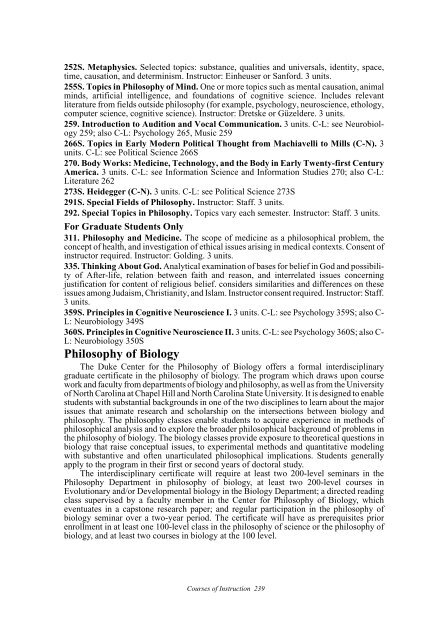Duke University 2008-2009 - Office of the Registrar - Duke University
Duke University 2008-2009 - Office of the Registrar - Duke University
Duke University 2008-2009 - Office of the Registrar - Duke University
Create successful ePaper yourself
Turn your PDF publications into a flip-book with our unique Google optimized e-Paper software.
252S. Metaphysics. Selected topics: substance, qualities and universals, identity, space,<br />
time, causation, and determinism. Instructor: Einheuser or Sanford. 3 units.<br />
255S. Topics in Philosophy <strong>of</strong> Mind. One or more topics such as mental causation, animal<br />
minds, artificial intelligence, and foundations <strong>of</strong> cognitive science. Includes relevant<br />
literature from fields outside philosophy (for example, psychology, neuroscience, ethology,<br />
computer science, cognitive science). Instructor: Dretske or Güzeldere. 3 units.<br />
259. Introduction to Audition and Vocal Communication. 3 units. C-L: see Neurobiology<br />
259; also C-L: Psychology 265, Music 259<br />
266S. Topics in Early Modern Political Thought from Machiavelli to Mills (C-N). 3<br />
units. C-L: see Political Science 266S<br />
270. Body Works: Medicine, Technology, and <strong>the</strong> Body in Early Twenty-first Century<br />
America. 3 units. C-L: see Information Science and Information Studies 270; also C-L:<br />
Literature 262<br />
273S. Heidegger (C-N). 3 units. C-L: see Political Science 273S<br />
291S. Special Fields <strong>of</strong> Philosophy. Instructor: Staff. 3 units.<br />
292. Special Topics in Philosophy. Topics vary each semester. Instructor: Staff. 3 units.<br />
For Graduate Students Only<br />
311. Philosophy and Medicine. The scope <strong>of</strong> medicine as a philosophical problem, <strong>the</strong><br />
concept <strong>of</strong> health, and investigation <strong>of</strong> ethical issues arising in medical contexts. Consent <strong>of</strong><br />
instructor required. Instructor: Golding. 3 units.<br />
335. Thinking About God. Analytical examination <strong>of</strong> bases for belief in God and possibility<br />
<strong>of</strong> After-life, relation between faith and reason, and interrelated issues concerning<br />
justification for content <strong>of</strong> religious belief. considers similarities and differences on <strong>the</strong>se<br />
issues among Judaism, Christianity, and Islam. Instructor consent required. Instructor: Staff.<br />
3 units.<br />
359S. Principles in Cognitive Neuroscience I. 3 units. C-L: see Psychology 359S; also C-<br />
L: Neurobiology 349S<br />
360S. Principles in Cognitive Neuroscience II. 3 units. C-L: see Psychology 360S; also C-<br />
L: Neurobiology 350S<br />
Philosophy <strong>of</strong> Biology<br />
The <strong>Duke</strong> Center for <strong>the</strong> Philosophy <strong>of</strong> Biology <strong>of</strong>fers a formal interdisciplinary<br />
graduate certificate in <strong>the</strong> philosophy <strong>of</strong> biology. The program which draws upon course<br />
work and faculty from departments <strong>of</strong> biology and philosophy, as well as from <strong>the</strong> <strong>University</strong><br />
<strong>of</strong> North Carolina at Chapel Hill and North Carolina State <strong>University</strong>. It is designed to enable<br />
students with substantial backgrounds in one <strong>of</strong> <strong>the</strong> two disciplines to learn about <strong>the</strong> major<br />
issues that animate research and scholarship on <strong>the</strong> intersections between biology and<br />
philosophy. The philosophy classes enable students to acquire experience in methods <strong>of</strong><br />
philosophical analysis and to explore <strong>the</strong> broader philosophical background <strong>of</strong> problems in<br />
<strong>the</strong> philosophy <strong>of</strong> biology. The biology classes provide exposure to <strong>the</strong>oretical questions in<br />
biology that raise conceptual issues, to experimental methods and quantitative modeling<br />
with substantive and <strong>of</strong>ten unarticulated philosophical implications. Students generally<br />
apply to <strong>the</strong> program in <strong>the</strong>ir first or second years <strong>of</strong> doctoral study.<br />
The interdisciplinary certificate will require at least two 200-level seminars in <strong>the</strong><br />
Philosophy Department in philosophy <strong>of</strong> biology, at least two 200-level courses in<br />
Evolutionary and/or Developmental biology in <strong>the</strong> Biology Department; a directed reading<br />
class supervised by a faculty member in <strong>the</strong> Center for Philosophy <strong>of</strong> Biology, which<br />
eventuates in a capstone research paper; and regular participation in <strong>the</strong> philosophy <strong>of</strong><br />
biology seminar over a two-year period. The certificate will have as prerequisites prior<br />
enrollment in at least one 100-level class in <strong>the</strong> philosophy <strong>of</strong> science or <strong>the</strong> philosophy <strong>of</strong><br />
biology, and at least two courses in biology at <strong>the</strong> 100 level.<br />
Courses <strong>of</strong> Instruction 239









